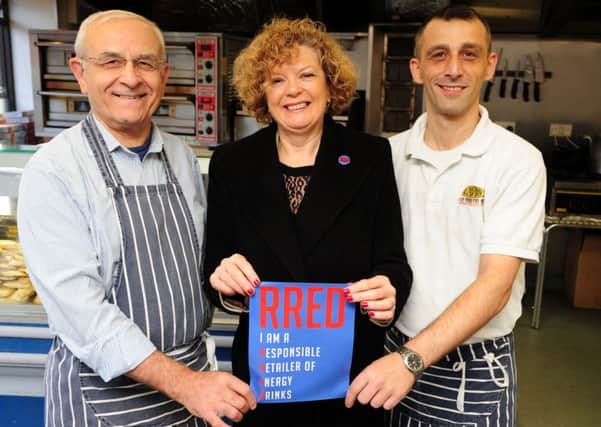Energy drinks banned from city sports centres


The radical move affects 30 council-owned venues and makes the Capital the first authority in Scotland to ban drinks such as Red Bull, Relentless and Monster from sports centres.
It means all Edinburgh Leisure centres – from the Commonwealth Pool to public golf clubs – will cease serving the stimulating drinks amid fears they are damaging public health.
Advertisement
Hide AdAdvertisement
Hide AdMany of the controversial products combine sugar, caffeine and supplements like taurine that experts warn may induce hyperactivity in children.
The ban has been hailed as the biggest victory yet for the Edinburgh-based Responsible Retailers of Energy Drinks campaign.
Councillor Norma Austin Hart, founder of RRED, said the decision by Edinburgh Leisure bosses marked a “big boost” to the drive to restrict the sale of energy drinks to children.
“It really sends out the right message,” she said. “Edinburgh Leisure has taken the quite radical step of saying ‘not only are we not going to sell them to under-16s, we’re not going to sell them at all’.”
A poster and leaflet campaign will be launched to explain Edinburgh Leisure’s decision to members.
“It is really hard work to persuade the shops to stop so this is a big step forward in terms of setting an example to others,” said Cllr Austin Hart.
Energy drinks typically contain anything between 80 milligrams of caffeine – the same as a large mug of coffee – to a head-spinning 400mg.
RRED campaigner Naveed Sattar, professor of metabolic medicine at the University of Glasgow, said there was mounting evidence that sugary drinks contribute to obesity and, in turn, meant a higher risk of diabetes.
Advertisement
Hide AdAdvertisement
Hide AdIn November last year, the Jubilee takeaway in West Granton Road became one of the first businesses in Edinburgh to back the campaign when owner Dante Cortellessa became concerned about the quantity children were buying.
Talks are ongoing with the Scottish Grocers’ Federation (SGF), which represents around 2000 stores, which said it will encourage its members to sign up as part of its aim of promoting responsible community retailing. Many schools across the city have imposed their own restrictions although there remains no formal council ruling on the drinks.
Graeme Gardiner, director of operations at Edinburgh Leisure, said the management’s decision was part of a drive to become a “healthier city”.
He said: “We are delighted to support the RRED campaign to ensure young people achieve more in 2015 without purchasing energy drinks in any Edinburgh Leisure facility.”
It is hoped the move will encourage other large leisure bodies – such as Glasgow Life – to follow suit before the ultimate goal of legislation to ban sales to under-16s.
Gavin Partington, director general at the British Soft Drinks Association, said: “Our code of practice says that high caffeine content soft drinks are not suitable for children, and specifies that this information should be clearly stated on the label. It also states that high-caffeine soft drinks should not be marketed to those under 16.
“Naturally it’s for retailers to decide what they do. We believe our code will ensure parents have the information necessary to decide what is right for their families.”
Study finds links to seizures, stroke and sudden death
High-caffeine drinks, often containing other ingredients such as taurine, guarana and ginseng, have been linked with causing “seizures, mania, stroke and sudden death”, according to one study by American doctors.
Advertisement
Hide AdAdvertisement
Hide AdWhile most campaigners argue too little research has been carried out, the University of Miami’s paediatrics department, said the drinks – which are often targeted at children – had adverse effects.
Published in the American journal Pediatrics, it concluded: “These drinks have been reported in association with serious adverse effects, especially in children, adolescents, and young adults with seizures, diabetes, cardiac abnormalities, or mood and behavioural disorders or those who take certain medications.”
They found high-caffeine drinks could “exacerbate cardiac conditions” in children.